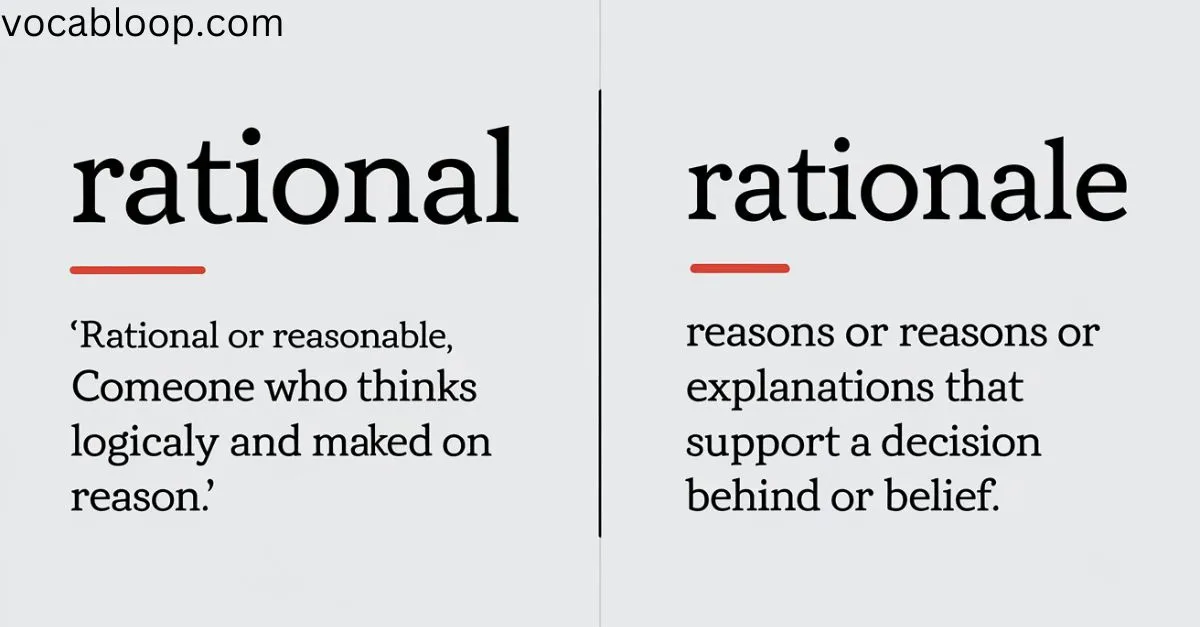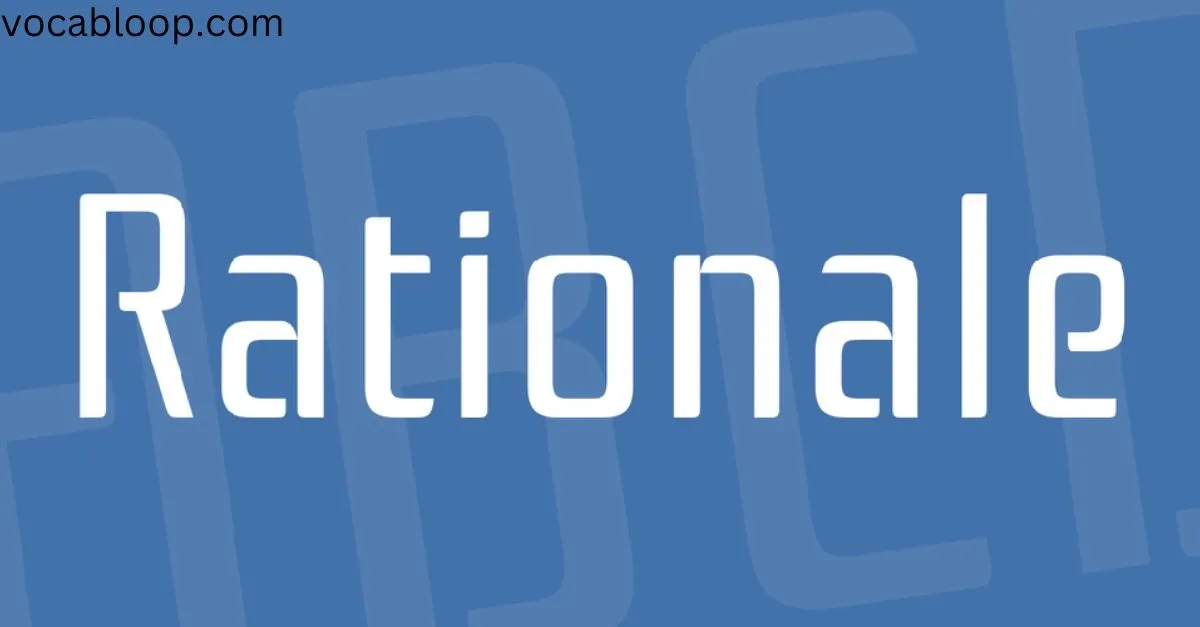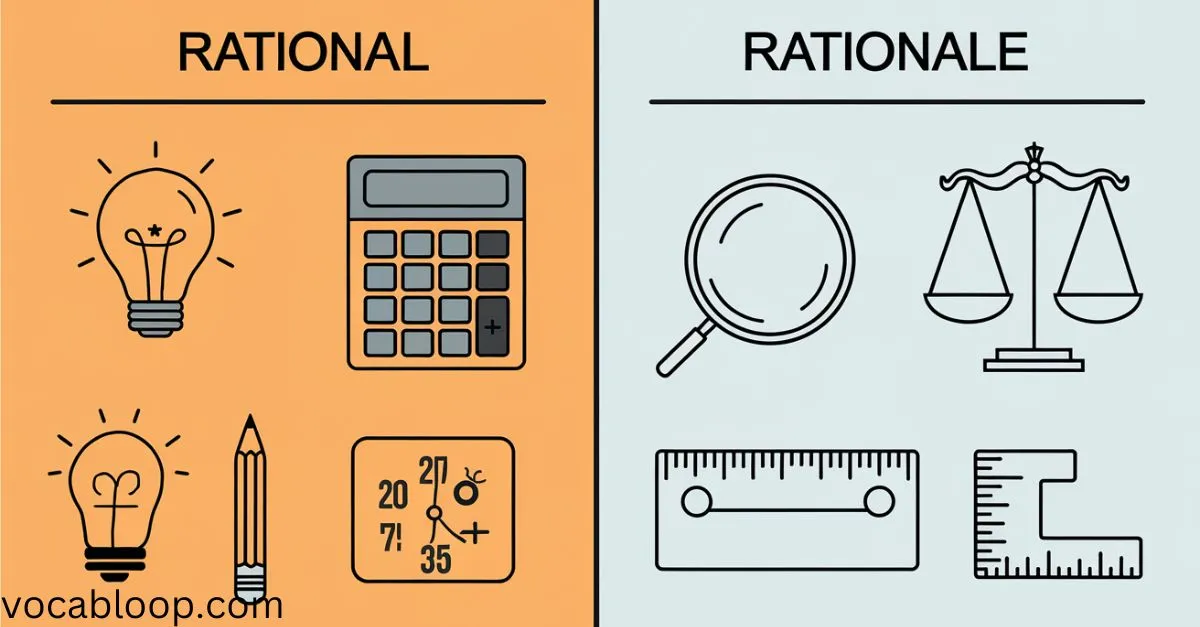In English, some words look or sound almost identical but carry entirely different meanings. Rational vs rationale are prime examples of this. While these terms share a common root and are often linked in usage, their meanings and grammatical roles set them apart. This subtle distinction can easily trip up even fluent speakers and writers.
Whether you’re describing logical behavior or explaining reasons behind a decision, choosing the correct word is crucial for clear and precise communication. In this article, we’ll explore the differences between rational vs rationale, providing definitions, usage examples, and helpful grammar tips to ensure you never confuse these closely related yet distinct terms again.
What Is There Confusion: Rational vs Rationale?

The confusion between rational vs rationale arises because they share the same Latin root, rationalis, meaning “reason or explanation.” Both words deal with logic and reasoning, but they differ in how they are used in sentences. Rational is an adjective describing logical thinking, while rationale is a noun referring to the reasoning behind something.
This similarity leads to common mistakes, especially for those learning English as a second language. For example, someone might say, “What’s the rational behind this rule?” when they mean “What’s the rationale?” To avoid such errors, it’s important to understand their distinct roles in grammar.
What Is Rational?

Is the Word Rational Correct?
Yes, rational is a correct and widely accepted term in English. It is primarily used as an adjective to describe thoughts, behaviors, or decisions that are logical, reasonable, and based on clear reasoning rather than emotions. Its usage spans both formal and casual contexts, particularly when discussing sound judgment or decision-making.
Definition:
Rational means “having or exercising reason and sound judgment.” The word underscores the importance of logical thinking and aligns with actions or thoughts grounded in evidence and clarity.
Meaning:
Rational describes a thought process or action that is guided by reason. It is often used when emphasizing logic over emotion, such as in debates, problem-solving, or evaluating decisions. For example, a rational explanation is one supported by evidence and logical structure.
Usage:
Rational frequently appears in discussions about decision-making, critical thinking, and resolving conflicts. Examples include:
- “She gave a rational response to the criticism, staying calm and factual.”
- “In difficult situations, it’s important to remain rational and consider all possible outcomes.”
What Is the Rationale?

Is the Word Rationale Correct?
Yes, rationale is a valid and commonly used word in English. Unlike rational, it is a noun and refers to the underlying reasoning or justification for a belief, decision, or action.
Definition:
Rationale means “the set of reasons or logical basis for a course of action or belief.” It highlights the purpose or explanation behind choices, offering a structured reasoning process.
Meaning:
Rationale answers the “why” behind decisions or actions, often providing the foundation for a proposal or idea. For instance, the rationale for implementing a new policy could involve increasing efficiency or addressing a specific problem.
Usage:
Rationale is commonly used in formal contexts, such as business, academics, or legal discussions, to justify actions or strategies. Examples include:
- “The rationale for this change is to improve productivity across departments.”
- “Before approving the project, the board asked for a clear rationale to understand its benefits.”
Quick Summary
Rational is an adjective that describes logical thinking or behavior. On the other hand, rationale is a noun that explains the reason behind an action or belief. The two words are not interchangeable, though they are related in meaning.
| Word | Part of Speech | Meaning | Example |
| Rational | Adjective | Logical, reasonable | He gave a rational argument. |
| Rationale | Noun | Reasoning or justification | The rationale was well-explained. |
Rational vs Rationale as Parts of Speech
Rational acts as an adjective. It modifies nouns by describing their logical qualities. For example, you can say, “She is a rational thinker,” where rational describes the thinker.
Rationale, is always a noun. It represents the reasoning or explanation itself. For example, “The rationale for this decision was clearly stated.” Understanding these grammatical roles helps avoid errors in writing and speaking.
Pronunciation of Rational vs Rationale

The pronunciation of rational vs rationale differs slightly, though their spellings are similar. Rational is pronounced /ˈræʃənl/, with a soft “a” and the emphasis on the first syllable. In contrast, rationale is pronounced /ˌræʃəˈnæl/, stressing the final syllable with a sharper “a” sound at the end.
This subtle difference often confuses non-native speakers. To master it, practice saying each word slowly and clearly, focusing on the stressed syllables. Listening to native speakers or using pronunciation tools can also help. Understanding these distinctions not only improves your speech but also enhances clarity in communication.
Side-by-Side Comparison: Rational vs Rationale
| Feature | Rational | Rationale |
| Part of Speech | Adjective | Noun |
| Meaning | Logical, reasonable | Reasoning, justification |
| Example Sentence | She made a rational choice. | The rationale was sound. |
Which One Is More Acceptable: Rational vs Rationale?
Both rational vs rationale are correct in English, but their usage differs by context. Use rational to describe logical thinking or reasonable behavior, such as “a rational decision.” On the other hand, rationale refers to the reasoning or motives behind something, like “the rationale for the policy.”
Mixing them up can lead to confusion, as their meanings and grammatical roles are distinct. To avoid errors, remember that rational is an adjective, while rationale is a noun. Knowing the difference ensures clarity and precision in your writing or speech.
Common Mistakes and How to Avoid Them
A common mistake is using rationale as an adjective or rational as a noun. For example, “His rationale behavior” is incorrect because rationale cannot describe behavior. Instead, say, “His rational behavior.” Similarly, avoid saying, “The rational for this decision,” which should be “The rationale.”
To avoid these errors, remember that rational describes “what” (logical), while rationale explains “why” (reasoning).
Trick to Remember the Difference: Rational vs Rationale
Rational ends with “-al,” which is commonly found in adjectives. This aligns with its function of describing logical or reasonable thinking. If you associate “-al” with traits like “logical,” “critical,” or “practical,” you’ll remember that rational applies to how someone thinks or acts.
Rationale ends with “-e,” which often marks nouns in English. Its meaning ties to explanations or justifications—think of the “e” as standing for “explanation” or “evidence.” This mnemonic helps connect rationale to the idea of reasons or a thought process behind decisions.
Origins of Rational vs Rationale
Rational
The word rational traces back to the Latin rationalis, which is derived from ratio, meaning “reason” or “calculation.” It entered Old French as rational, carrying its logical and practical connotations. By the 14th century, rational had become a part of English vocabulary, used to describe people, actions, or ideas grounded in reason and clear thought.
During the Enlightenment period, when logic and scientific reasoning were emphasized, rational gained even more significance. Philosophers like René Descartes often focused on rational thinking as a key to understanding the world. Its role as an adjective tied to logical reasoning solidified its modern usage.
Rationale
The word rationale also comes from rationalis but took a different evolutionary route. Borrowed into English in the 17th century, rationale emerged as a noun specifically referring to the “reasoning” or “justification” behind actions or beliefs. Its formation was influenced by the use of Latin in academic, legal, and philosophical texts of the time, where precision in language was crucial.
Rational, which describes traits or qualities, rationale developed as a technical term for presenting formal reasoning. For instance, in law or philosophy, providing the rationale for a judgment or argument became a standard practice. This distinction marked rationale as a key noun in explaining the thought process or logic behind decisions.
Synonyms of Rational vs Rationale
Rational:
- Logical
- Reasonable
- Analytical
- Sensible
- Clear-headed
- Thoughtful
- Practical
- Intelligent
- Coherent
- Judicious
Rationale:
- Reasoning
- Justification
- Explanation
- Basis
- Logic
- Grounds
- Argument
- Premise
- Foundation
- Motive
Sentences in Daily Usage of Rational vs Rationale
Rational:
- His arguments were entirely rational.
- She remained rational during the crisis.
- Making a rational choice is crucial in business.
- He prefers rational thinking over impulsive decisions.
- It’s not rational to ignore these facts.
- Rational behavior often leads to better outcomes.
- The team presented a rational solution to the problem.
- Her rational mind impressed the audience.
- A rational approach can save time.
- He asked for a rational explanation.
Rationale:
- The rationale for this change is clear.
- Can you explain your rationale to the team?
- The rationale behind the project is well-founded.
- His rationale didn’t convince the board.
- They questioned the rationale of the decision.
- The rationale for the policy was well-documented.
- What’s the rationale behind this rule?
- Her rationale for leaving was personal.
- The rationale must be communicated effectively.
- Everyone understood the rationale for the delay.
FAQs
What’s the key difference between rational and rationale?
Rational describes logic or reason, while rationale explains the reason behind something.
Are rational and rationale interchangeable?
No, they have different roles in grammar and meaning.
How do I pronounce rational vs rationale?
Rational: /ˈræʃənl/. Rationale: /ˌræʃəˈnæl/.
Can rationale describe a person?
No, rationale cannot describe a person. Use rational instead.
What are some common synonyms for rationale?
Justification, reasoning, and explanation are common synonyms.
Conclusion
Understanding the nuances of rational vs rationale can greatly enhance your communication skills. While rational describes logical thinking or sound judgment, rationale explains the reasoning behind actions or beliefs. Recognizing their distinct roles in grammar and usage helps you convey ideas with precision and clarity.
Whether discussing a rational decision or explaining the rationale for a strategy, selecting the correct term ensures your message is both accurate and impactful. By mastering these subtle differences, you can avoid common mistakes, strengthen your language skills, and communicate more effectively in both professional and everyday contexts.

Alex Hormozi is a seasoned blogger at Vocab Loop, known for his deep insights into language, vocabulary, and grammar. With years of experience in writing, Alex shares practical tips and effective strategies to help readers improve their linguistic skills and enhance their writing abilities.

